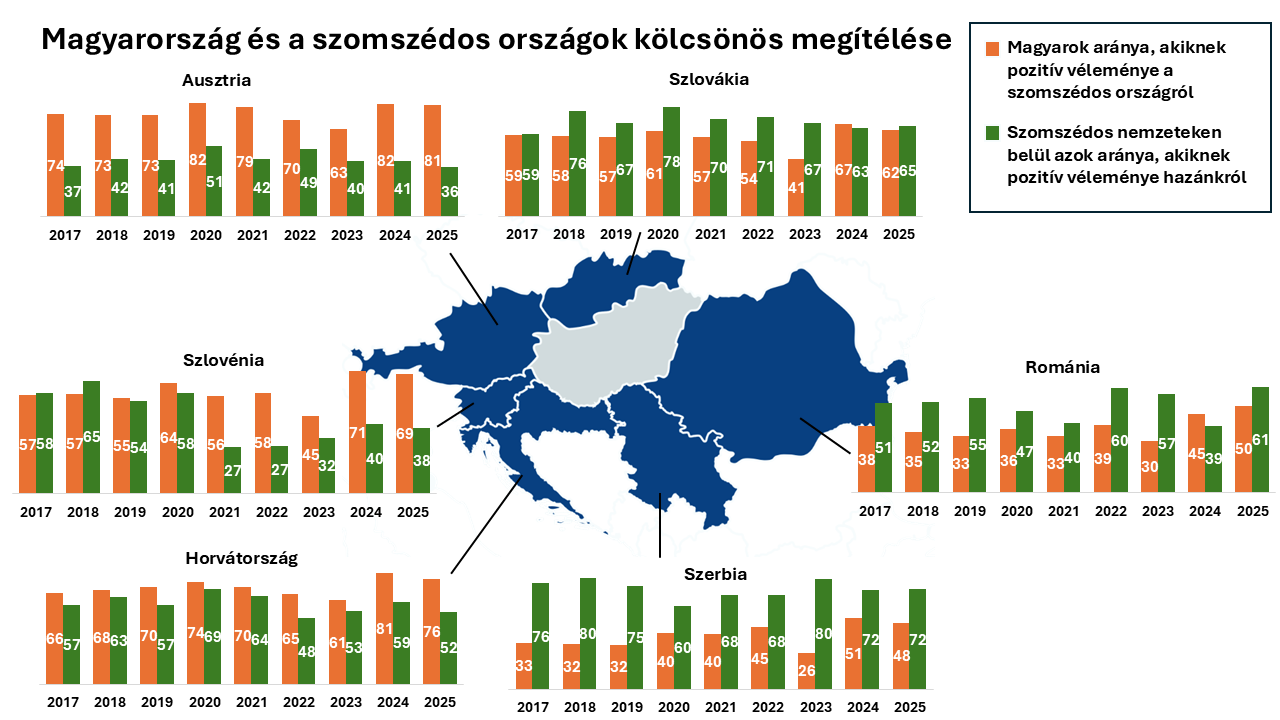Slovaks, Romanians and Serbs have a more positive view of Hungary than Hungarians have of their countries. However, in all three cases, opinions have become more balanced in recent years, and nearly half of Hungarians have a positive view of all neighbouring countries. On the other hand, Austrians, Croats, and Slovenes are critical of Hungary, which is primarily due to their domestic political landscape, according to the Hungary-Barometer 2025 survey conducted by the Nézőpont Institute for the ChartaXXI Reconciliation Movement.
The Russian-Ukrainian war since 2022 has created an uncertain political and economic environment for the countries in the region directly bordering Ukraine. In this situation, Hungary has undertaken a courageous peace mission and called on all parties to bring the conflict, which has claimed numerous lives, to an end as soon as possible. From a Hungarian perspective, an important question is how Hungary's perception has changed among its neighbours during these challenging times, as well as how Hungarians' opinions about the neighbouring countries have evolved. This is the subject of the ninth edition of the Nézőpont Institute's Hungary Barometer.
In order to prepare the Hungary Barometer 2025, nationwide surveys were conducted in Hungary and six neighbouring countries in January 2025, with a nationally representative sample of 1,000 respondents in each country. As a result, we have obtained reliable information on public opinion in all seven countries, as well as on their mutual perceptions of each other.
Those who view Hungary more favourably than Hungarians view them
Hungarians (62 percent) and Slovaks (65 percent) hold similarly high positive view of each other’s countries. Since October 2023, the leaders of the two countries have once again reinforced each other's positions on strategic issues, such as advocating a pro-peace stance in the Russia-Ukraine and defending sovereignty against the federalist institutions of the European Union. Between 2018 and 2023, Slovaks consistently had a better opinion of our country than Hungarians had of Slovakia. However, the formation of the Fico government brought a clear improvement. The figures for 2024 and 2025 essentially show that nearly two-thirds of both nations have a positive opinion of the other's country, which can be considered a historic success following the numerous conflicts of the 20th century.
Half of Hungarians (50 percent) have a positive view of Romania, representing the second consecutive year of improvement in perceptions of our eastern neighbour. Earlier, only a third of Hungarians said they had a positive image of Romania. Romanians' perceptions of Hungary have fluctuated in recent years. While the high proportion of positive opinions in the first two years of the war declined in 2024 (39 percent), this year, the proportion of Romanians with a positive opinion of Hungary has risen to 61 percent, surpassing even the level of the previous years. The low point can be attributed to the nearly 20 percent result of anti-Hungarian parties in the European Parliament elections, while the subsequent rebound was undoubtedly boosted by Romania's accession to the Schengen area, in which the Hungarian government played a committed and organising role during its EU presidency.
A relative majority of Hungarians (48 percent) hold a positive view of Serbia, which is similar to the improvement in perceptions of Romania over the past nine years. Earlier, only a third of Hungarians had a positive view of our southern neighbour. Serbs' opinion of Hungary has been consistently high in recent years, reinforced by the alliance between the Hungarian Prime Minister and the Serbian President. Without the cooperation between the two countries, the pressure of illegal migration in the Balkans would have been unmanageable, the construction of the strategically important Budapest-Belgrade railway line would not have started, and there would be no successful cooperation in the field of energy security, in which the Turkish Stream, which also passes through both countries, could play a greater role in the future than ever before.

Neighbours Hungarians view more favourably than they view Hungary
Three-quarters of Hungarians (76 percent) had a positive opinion of Croatia at the beginning of 2025, while 52 percent of Croats had a good opinion of Hungary. Hungarians' positive image of Croatia is probably apolitical, more linked to the Adriatic coast, while Croats' view of Hungary is very political. The long-running MOL-INA case, which has been a source of tension in relations since 2013 and in which an international arbitration court ruled against Croatia with a significant fine, has cast a shadow over bilateral relations. However, in January 2025, Croatia re-elected Zoran Milanović as its president, who shares similar views with the Hungarian government on divisive international issues. He opposes military aid to Ukraine and is also critical of the European Union’s federalization efforts.
The majority of Hungarians (69 percent) also had a positive opinion of Slovenia at the beginning of 2025. In Hungary, the perception of our south-western neighbour is not a political issue either, Hungarians primarily associate Slovenia with tourism. However, the situation is quite the opposite in Slovenia, where only 38 percent of the population has a positive opinion of Hungary. This divide is not surprising, given that Slovenian domestic politics have plenty of Hungarian aspects. The main opponent of the left-wing Golob government is Janez Janša, who is a long-time ally of Viktor Orbán, and both are frequently attacked and demonized by Slovenia’s left-wing media and political elite.
Hungarians clearly have the most favourable opinion of Austria. Four-fifths of Hungarians (81 percent) had a positive view of Austria at the beginning of 2025, while, as in previous years, only a minority of Austrians (36 percent) had a positive opinion of Hungary. Hungarians’ more favourable perception of our western neighbour (“brother-in-law”) can be attributed to Austria’s longstanding role as a model country and Hungary’s ambition to catch up economically. However, relations between the two countries are expected to improve further, as Austria's autumn elections were won by the FPÖ, Fidesz’s European ally, giving the Freedom Party leader a realistic chance of becoming the next Austrian chancellor.
Methodology
The data used in the survey are the results of a public opinion poll conducted by the Nézőpont Institute, by interviewing 1,000 respondents per country by phone or in person. For all surveys, the sample is representative of the adult population (18 years and older). The margin of sampling error is ± 3.16 percent. The data for the 2025 Barometer were collected in January 2025. Respondent base = total adult population.
More information about the CharterXXI Reconciliation Movement can be found here: https://chartaxxi.eu/

